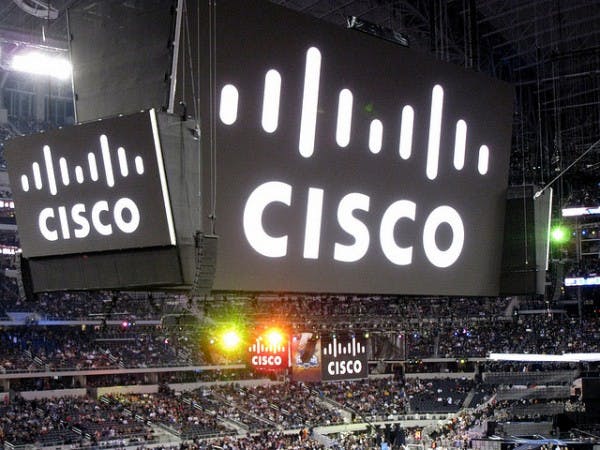Shares of Cisco Systems, Inc. (NASDAQ:CSCO) have traded down as much as 5% over the past couple days after reaching a new 52-week high of $21.98. Investors have grown concerned after Scott Thompson, an analyst of FBR Capital, cut his rating on the stock to “underperform.”

Let’s not get carried away
I found those comments to be pretty odd. It suggests that Cisco Systems, Inc. (NASDAQ:CSCO) will be unable to adapt to new trends. In fact, adapting and evolving has been the company’s biggest strength over the past couple of years. Thompson’s research also concluded that “the next generation of network and data-center hardware will blur the boundaries between routing, switching, and computing, providing a single hardware platform on which network and computing functions will be delivered through software applications.”
Again, I have to disagree. I don’t think Thompson has studied Cisco’s recent performances. While he is correct by suggesting that Cisco’s routing and switching businesses have not performed up to their usual standards, the company has not been asleep at the wheel, either. As the hardware business has struggled, management has been investing heavily to shore up Cisco’s cloud position, while also picking off several companies that strengthen Cisco’s software-defined networking, or SDN, position.
Case in point: In Cisco’s first-quarter report, both routing and switching businesses dropped 2% sequentially and 3% year over year. In the second quarter, however, both hardware units went in opposite directions as switch revenue grew 3% year over year, while routing revenue shed more than 5%. Again, not exactly robust figures, but the company’s not concerned, and that’s for good reason.
Given Cisco’s acquisitions of Cariden, Meraki and BroadHop, Thompson should have been able to see that the company is phasing out its focus on hardware. Cisco Systems, Inc. (NASDAQ:CSCO) has not been investing to grow its hardware business. Besides, as Cisco’s evolution continues, hardware will eventually comprise of single-digit revenue, while the software, cloud, and SDN businesses grow.
It’s smart execution, especially since the margins in the hardware line haven’t been that impressive recently, at least not when compared to the company’s stronger growth businesses such as data center and wireless revenue, which grew in the quarter by 65% and 20%, respectively.
There’s more to Cisco than networking
While Thompson may disparage Cisco’s long-term networking potential, investors have to realize that there is more to this business than managing data. Cisco recently unveiled its virtual cloud-routing and WAN optimization platform aimed at taking a bite of out Riverbed Technology, Inc. (NASDAQ:RVBD)‘s 52% share. Plus, with Cisco Systems, Inc. (NASDAQ:CSCO)’s $46 billion in cash, there’s a good chance that this level of assault on rivals has only just begun.
What’s more, Cisco also has a strong security services business. While security is not growing at the rate of Fortinet Inc (NASDAQ:FTNT), Cisco is doing more than holding its own. And Cisco’s acquisition of Intucell extends Cisco’s reach into new end markets like self-optimized network, or SON, which support mobile carrier networks across the world. This is while also allowing Cisco to extend its network intelligence. Again, this is yet another example of how Cisco Systems, Inc. (NASDAQ:CSCO) is adapting to changing trends.
Fundamentals are too strong
The company has become a savvy acquirer and has used the recent macro headwind to its advantage, while rivals like Juniper Networks, Inc. (NYSE:JNPR) have been looking for ways to cut costs. And considering how brutal these recent earnings reports have been, if Thompson is right about Cisco (I don’t believe he is), it would imply that rivals like Juniper and Riverbed should be in worse shape.
Here again, Cisco Systems, Inc. (NASDAQ:CSCO)’s strong cash position can buy access into many markets. This is not an advantage that either Juniper or Riverbed has. I don’t think that Thompson made this consideration. Thompson also listed Broadcom Corporation (NASDAQ:BRCM) as one of the companies that should benefit from these new trends, while citing Broadcom Corporation (NASDAQ:BRCM)’s advantage with ARM Holdings plc (ADR) (NASDAQ:ARMH) V8 architectural license.
This is true. However, given Broadcom Corporation (NASDAQ:BRCM)’s $19 billion market cap and Cisco’s $46 billion in cash… well, as I’ve said before, there’s nothing stopping Cisco Systems, Inc. (NASDAQ:CSCO) from buying its way into new territories. All of this makes Cisco still one of the best and safest stocks to own. Despite what Thompson may want to believe, based on cash flow projections and sales trends, which includes 22% aggregate growth in services, this stock is worth (at least) $30 per share.
The article Is Cisco Really in Danger? originally appeared on Fool.com.
Fool contributor Richard Saintvilus has no position in any stocks mentioned. The Motley Fool recommends Cisco Systems (NASDAQ:CSCO) and Riverbed Technology (NASDAQ:RVBD). The Motley Fool owns shares of Riverbed Technology.
Copyright © 1995 – 2013 The Motley Fool, LLC. All rights reserved. The Motley Fool has a disclosure policy.
